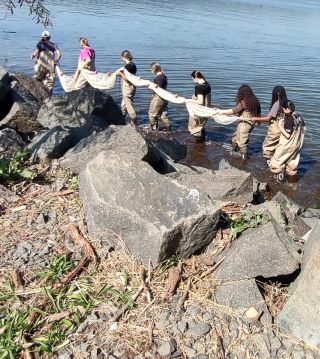Relationships
How to Create New Relationship Possibilities
Personal Perspective: An ecological framework for mutual learning.
Posted November 1, 2023 Reviewed by Kaja Perina
"The familiar is not the only way." -Nora Bateson
"If you talk to a man in a language he understands, that goes to his head. If you talk to him in his own language, that goes to his heart." -Nelson Mandela
A recent press release from the U.S. Census Bureau (September 17, 2023) stated that 46.4 percent of U.S. adults are single and a 2021 Pew Research Center report that there is a decrease in those looking for meaningful relationships. The resulting media takeaway from these reports is that Americans are moving towards being more independent and less interested in relationships.
Surveys such as these offer little context and provide isolated generalizations. The danger can be like focusing on a finger pointing to the moon rather than on the illumination that is the moon.
After forty years of being a family therapist, I do agree that "It is all about relationships" and "It takes two to know one," as anthropologist Gregory Bateson was fond of saying. However, relationships will be unfulfilling without communication that is ecological and supports interdependency.

Why the importance of interdependency? Our Western culture tends to pull things apart that are inherently interdependent. The consequences are that the systems that encompass each one of us such as family, educational, political, legal, environmental, media, art, medical, and others become defined by their fragmentation. This makes it difficult to create and encourage interdisciplinary communication possibilities.
The consequence is to decontextualize our behaviors which can lead to inevitable paradoxes. This is where facts become contradictions. It is like the doctor telling her patient, (with acknowledgment to George Burns and Gracie Allen), that “It may not be in your interest to have a baby after thirty-five” and she responds, “Who would want thirty-six children.” This can continue to confuse the patient unless some clarity is achieved.
It can serve as a source of humor but will more than likely foster painful double binds and a potential pattern of being between a rock and a hard place. A classic example is someone asking their significant other "Do you love me?" When their partner answers affirmatively, they are told, "Why do I have to ask you." Not the best way to pursue or sustain a productive relationship.
Can communication that supports interdependence encourage more meaningful relationships? Would it help resolve paradoxes and transcend double binds? That would entail a change in relational perspective from one based on cause and effect to one that is ecological.
Communication that is ecological is based on interactions that simultaneously influence other contexts. The emphasis is on what is being mutually learned in that space between individuals. It is a win-win volley of expression, checking, and paraphrasing. For example, a good starting place can be two people or a group using a prompt or inquiry such as "What is occurring across different systems of family, school, and environment?"
The ensuing exchange of personal stories forms a collaboration that shapes other interrelated situations. It includes different but interconnected perspectives. This can include, for example, questions such as where is the child in relation to these contexts, or how can a change in one affect the others, etc.? How is parenting, for instance, accomplished regarding climate challenges and family dynamics? What if education was discussed in terms of how one learns to see, feel, smell, and touch, or what makes up a forest or an estuary? How is well-being influenced by different nutrients or pharmaceutical companies? New and relevant solutions will continue to appear to help answer these important questions.
This underscores the importance of relationships based on an ecological perspective that encourages new possibilities. It also necessitates the need for forums to search and nurture connecting behavioral patterns in our world. It is a clear example of the whole (our communities, culture, environment, etc.) being more than the sum of its parts. In her wonderful new book "Combining" Nora Bateson encourages us to ask, "How can we communicate about ecology if our communication is not itself ecological?" She also believes that "...possibility lies in the combining and recombining of minutiae."
This framework depends on a peripheral view that understands interdependency such as the farmer who grew the grains for the baker's interpretation of bread, that became your toast, holding the eggs that came from the poultry farm, and so on.
The decline in relational interest mentioned in the above surveys is a consequence of not understanding our interdependency. Life can be simultaneously messy and beautiful. It is also navigable if we accept how contexts are connected and "transcontextual" (part of other wider contexts). Learning, healing, foresting, meadowing, nutritioning, relationing, familying, and so on can no longer be seen in isolation. They are symbiotic and can only be defined and nurtured through mutually driven relationships.
We all view and construct the world differently. Yet we humans have the potential to share biological rhythms. This occurs if we allow ourselves to synchronize our communication with each other. An "ah" experience emerges when we pause and reflect on our conversations. We have all had this happen in our lives, especially in an equitable conversation that includes a sense of profound connection. My mentor, Anthropologist Paul Byers called it “good vibrations."
Here's an exercise that creates a perspective that can help discover an infinite amount of possibilities to enhance relationships:
Imagine yourself in a familiar room that is comfortable and safe.
Allow yourself to have a built-in personal camera-like lens. Use this lens to create an image of an instance where you have been frustrated in a relationship.
Take an inventory of how your senses and body responded then and now.
Pause and create a peripheral view. While looking forward, see what is in front of you. Then while still looking forward and not moving your eyes, see what is above and then to each side of you. Gradually widen your lens and imagine what is outside your room. Take note of what is going on in your community. Zoom out even further with your mind’s eye seeing what is happening worldwide. Stop and absorb this larger perspective.
Gradually have your lens zoom back to your room still looking forward. Ask yourself if I am in a mutually satisfying relationship, who and what would I be? Pause and visualize your answer within the original frustrating relational issue. Ask yourself what possibilities you now have that could have made a difference in that relationship. Then allow yourself to consider a new personal perspective on maintaining relationships.




